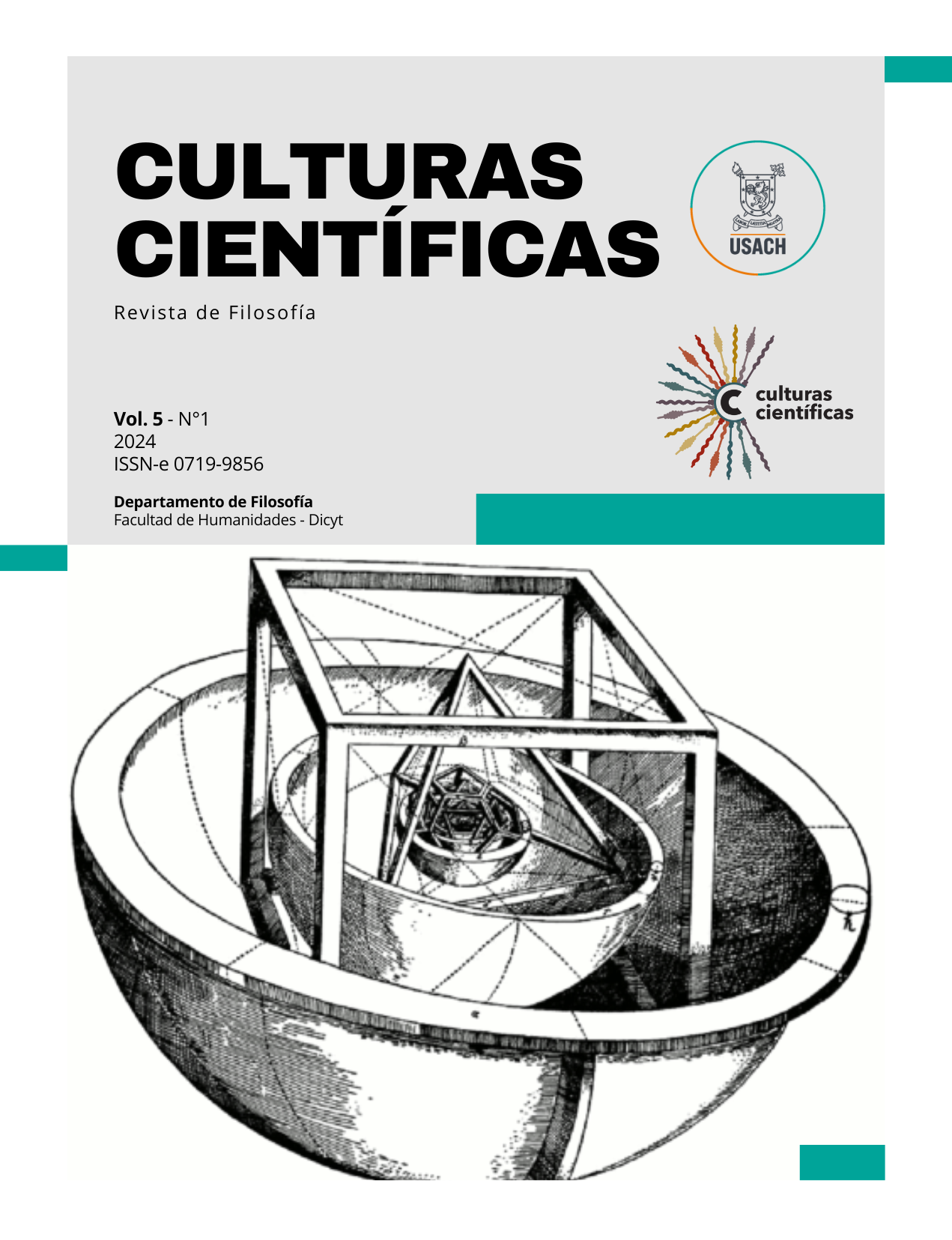El Problema de la Individualidad Biológica en Medicina
DOI:
https://doi.org/10.35588/cc.v5i1.6414Palabras clave:
Individualidad biológica, individualización, filosofía de la medicina, medicina basada en evidencia, medicina personalizadaResumen
La relevancia del estudio de las diferencias individuales biológicas en relación con la salud ha ido aumentando progresivamente, y el auge actual de la medicina personalizada es un ejemplo de ello. En este campo, el conjunto único de características de cada paciente individual es la base para diagnósticos y tratamientos personalizados. El objetivo de este trabajo es analizar y definir el problema de la individualidad biológica en medicina, La individualidad biológica se refiere a la singularidad biológica de cada individuo humano y su impacto en la toma de decisiones clínicas las propiedades de los pacientes de ser biológicamente únicos en un modo que atañe a la medicina, en tanto que tiene un impacto en la evaluación y toma de decisiones clínicas respecto del estado de salud del paciente individual. Se analizará este problema en relación con las categorías generales en medicina, centrándose en la medicina basada en evidencia, los ensayos clínicos aleatorizados y la definición de valores de referencia en el laboratorio clínico. Se argumentará que el problema de la individualidad biológica en relación con las categorías generales en salud es fundamentalmente un problema epistemológico relacionado con la validación externa de la evidencia clínica. Además, se explorará cómo la individualización de la medicina, cuyo exponente actual es la medicina personalizada, representa un intento de resolver el problema de la individualidad biológica señalado anteriormente. No obstante, en este contexto también se plantean desafíos de naturaleza tanto epistemológica como metafísica, estos últimos relacionados con la definición de salud y enfermedad.
Descargas
Referencias
[US] National Academy of Sciences (NAS) (2011). Toward Precision Medicine: Building a Knowledge Network for Biomedical Research and A New Taxonomy of Disease. NAS. Disponible en: https://nap.nationalacademies.org/read/13284/chapter/1#ii
Abettan, C. (2016). Between hype and hope: What is really at stake with personalized medicine? Medicine, Health Care and Philosophy, 19, 423-430. https://doi.org/10.1007/s11019-016-9697-2
Aliseda, A. (2022). Hacia una caracterización del razonamiento clínico: una perspectiva epistemológica. En A. Aliseda, C.N. Calderón Aguilar y M. Villanueva, M. (eds). Filosofía de la Medicina. Discusiones y Aportaciones desde México (63-80 pp.) UNAM.
Barilan, M.Y. y Brusa, M. (2022). Precision and persons in medicine. An introduction. En M.Y. Barilan; M. Brusa y A. Ciechanover, A. (eds.). Can precision medicine be personal? Can personalized medicine be precise? (pp. 1-10). Oxford University Press.
Bird, A. y Tobin, E. (2024). Natural Kinds. En E. N. Zalta y U. Nodelman (eds.), The Stanford Encyclopedia of Philosophy (Spring 2024 Edition). URL = <https://plato.stanford.edu/archives/spr2024/entries/natural-kinds/>
Baedke, J. (2019). What is a biological individual? Old questions and young approaches to animal evolution, 269-284.
Boniolo, G., y Testa, G. (2012). The identity of living beings, epigenetics, and the modesty of philosophy. Erkenntnis, 76, 279-298. https://doi.org/10.1007/s10670-011-9308-9
Bueno, O., Chen, R. L., y Fagan, M. B. (2018). Individuation, process, and scientific practices. En O. Bueno, R. L. Chen, & M. B. Fagan (Eds.), Individuation, process, and scientific practice (pp. 1-20). Oxford University Press.
Cartwright, N. (2007). Are RCTs the gold standard? BioSocieties, 2(1): 11-20. https://doi.org/10.1017/S1745855207005029
Chen, R.L. (2016). The experimental realization of individuality. In Individuals across the sciences, eds. Alexandre Guay and Thomas Pradeu, 348– 370. Oxford: Oxford University Press.
Childs, B., Wiener, C., & Valle, D. (2005). A science of the individual: implications for a medical school curriculum. Annual Review of Genomics and Human Genetics, 6, 313-330. https://doi.org/10.1146/annurev.genom.6.080604.162345
Clarke, E. (2010). The Problem of Biological Individuality. Biological Theory, 5(4), 312–325. https://doi.org/10.1162/BIOT_a_00068
Collins, F.S., y McKusick, V.A. (2001). Implications of the Human Genome Project for medical science. Jama, 285(5): 540-544. https://doi.org/10.1001/jama.285.5.540
Council of the European Union (2015). Notices from European Union institutions, bodies, offices and agencies. OJEU, 2015 Disponible en: http://data.consilium.europa.eu/doc/document/ST-15054-2015-INIT/en/pdf.
Delehanty, M. (2019). The changing landscape of the philosophy of medicine. Philosophy Compass, 14(8): e12612.
Dupré, J. (2012). Processes of life: Essays in the philosophy of biology. Oxford: Oxford University Press. https://doi.org/10.1093/acprof:oso/9780199691982.001.0001
Elwick (2017). Distrust That Particular Intuition: Resilient Essentialisms and Empirical Challenges in the History of Biological Individuality. En S. Lidgard y L.K. Nyhart (Eds.), Biological Individuality (pp. 277-296). University of Chicago Press.
Fangerau, H. y Badura-Lotter, G. (2019). Biomedicine and Bioethics. En A. Görgen, G.A. Nunez y H. Fangerau (eds.). Handbook of Popular Culture and Biomedicine (pp. 41-55). Springer. https://doi.org/10.1007/978-3-319-90677-5
Gervasini, G. (2019). Farmacogenética y medicina personalizada. ¿Se están cumpliendo las expectativas? Medicina clínica, 152(9): 368-371. https://doi.org/10.1016/j.medcli.2018.12.001
Ghiselin, M. T. (1974). A radical solution to the species problem. Systematic Biology, 23(4), 536-544. https://doi.org/10.1093/sysbio/23.4.536
Gilbert S. F. (2011). Symbionts as Genetic Sources of Hereditable Variation. En S. B. Gissis y E. Jablonka (ed.). Transformations of Lamarckism: From Subtle Fluids to Molecular Biology. MIT Press.
Gilbert SF (2014) A holobiont birth narrative: the epigenetic transmission of the human microbiome. Frontiers in Genetics, 5, 110025. https://doi.org/10.3389/fgene.2014.00282
Gilbert, S. F., Sapp, J., y Tauber, A. I. (2012). A symbiotic view of life: we have never been individuals. The Quarterly review of biology, 87(4), 325-341. https://doi.org/10.1086/668166
Gracia, J. J. (1988). Individuality: an essay on the foundations of metaphysics. Suny Press.
Gräsbeck, R. (2004). The evolution of the reference value concept. Clinical Chemistry and Laboratory Medicine (CCLM), 42(7), 692-697. https://doi.org/10.1515/CCLM.2004.118
Green, S., Dam, M. S., y Svendsen, M. N. (2022). Patient-Derived Organoids in Precision Oncology Precision oncology–Towards a Science of and for the Individual? En C. Beneduce y M. Bertolasao (eds). Personalized Medicine in the Making: Philosophical Perspectives from Biology to Healthcare (pp. 125-146). Springer.
Guttinger, S. y Dupré. J. (2016). Genomics and Postgenomics. En E. N. Zalta y U. Nodelman (eds.), The Stanford Encyclopedia of Philosophy (Winter 2016 Edition). URL = <https://plato.stanford.edu/archives/win2016/entries/genomics/>.
Haber, M. H. (2016). The individuality thesis (3 ways). Biology & Philosophy, 31, 913-930. https://doi.org/10.1007/s10539-016-9548-9
Hedgecoe, A. (1998). Geneticization, medicalisation and polemics. Medicine, health care, and philosophy, 1(3): 235. https://doi.org/10.1023/A:1009969226655
Hoeyer, K. (2019). Data as promise: Reconfiguring Danish public health through personalized medicine. Social studies of science, 49(4), 531-555. https://doi.org/10.1177/0306312719858697
Howick, J.H. (2011). The philosophy of evidence-based medicine. John Wiley & Sons.
Hull, D. L. (1976). Are species really individuals?. Systematic zoology, 25(2), 174-191. https://doi.org/10.2307/2412744
Hull, D. L. (1978). A matter of individuality. Philosophy of science, 45(3), 335-360. https://doi.org/10.1086/288811
Inkpen, S. A. (2019). Health, ecology and the microbiome. Elife, 8, e47626. https://doi.org/10.7554/eLife.47626
Kaiser, M.I. y Trappes, R. (2021). Broadening the problem agenda of biological individuality: individual differences, uniqueness and temporality. Biology & Philosophy, 36, 15. https://doi.org/10.1007/s10539-021-09791-5
Kovaka, K. (2015). Biological Individuality and Scientific Practice, Philosophy of Science, 82(5), 1092–1103. https://doi.org/10.1086/683443
Lidgard S. y Nyhart, L. (2017). The Work of Biological Individuality: Concepts and Contexts”. En S. Lidgard y L.K. Nyhart (eds.). Biological individuality: Integrating scientific, philosophical, and historical perspectives (pp. 17-62). University of Chicago Press.
Lippman, A. (1992). Led (astray) by genetic maps: The cartography of the human genome and health care. Social Science Medicine, 35(12): 469–1476.
Lohr, K. N., y Field, M. J. (Eds.). (1990). Clinical practice guidelines: directions for a new program (Vol. 90, No. 8). National Academies Press.
Lombardi, O. y Castagnino, M. (2008). A modal-Hamiltonian interpretation of quantum mechanics. Studies in History and Philosophy of Modern Physics, 39, 380-443. https://doi.org/10.1016/j.shpsb.2008.01.003
Love, A. C., y Brigandt, I. (2017). Philosophical Dimensions of Individuality. En S. Lidgard y L.K. Nyhart (Eds.), Biological Individuality (pp. 318-348). University of Chicago Press.
Lovly, C. M., y Carbone, D. P. (2011). One size does not fit all. Nature Reviews Clinical Oncology, 8(2): 68-70. https://doi.org/10.1038/nrclinonc.2010.224
Lowe, E.J. (2003). Individuation. In M.J. Loux & D.W. Zimmerman, (Eds.), The Oxford Handbook of Metaphysics (pp. 75–95). Oxford University Press.
Manrai, A.K., Patel, C.J., y Ioannidis, J.P. (2018). In the era of precision medicine and big data, who is normal? Jama, 319(19): 1981-1982. https://doi.org/10.1001/jama.2018.10956
Mant, D. (1999). Can randomised trials inform clinical decisions about individual patients?. The Lancet, 353(9154), 743-746. https://doi.org/10.1016/S0140-6736(98)09102-8
Meincke, A. S. (2022). One or two? A Process View of pregnancy. Philosophical Studies, 179(5): 1495-1521.
Nicholls, S. G., Wilson, B. J., Castle, D., Etchegary, H., y Carroll, J. C. (2014). Personalized medicine and genome-based treatments: why personalized medicine≠ individualized treatments. Clinical Ethics, 9(4): 135-144. https://doi.org/10.1177/147775091455855
Nimmesgern, E., Benediktsson, I., y Norstedt, I. (2017). Personalized medicine in Europe. Clinical and translational science, 10(2): 61-63.
Nuño de la Rosa, L., Pavlicev, M. y Etxeberria, A. (2019) Rethinking the Individuality of Pregnancy: Eutherian Pregnancy as an Evolved Relational Novelty. Preprints 2019, 2019100127
Perlman, R. L. (2000). The concept of the organism in physiology. Theory in Biosciences, 119(3-4), 174-186.
Pokorska-Bocci, A., Stewart, A., Sagoo, G. S., Hall, A., Kroese, M., & Burton, H. (2014). 'Personalized medicine': what’s in a name? Personalized Medicine, 11(2): 197-210. https://doi.org/10.2217/pme.13.107
Pradeu, T. (2010). What is an organism? An immunological answer. History and Philosophy of the Life Sciences, 32(2–3): 247–268. https://www.jstor.org/stable/23335074
Pradeu, T. (2012) The Limits of the Self: Immunology and Biological Identity. Oxford University Press.
Pradeu, T. (2016a). The Many Faces of Biological Individuality, Biology & Philosophy, 31(6): 761–773. https://doi:10.1007/s10539-016-9553-z
Pradeu, T. (2016b). Organisms or biological individuals? Combining physiological and evolutionary individuality. Biology and Philosophy, 31(6): 797–817. https://doi.org/10.1007/s10539-016-9551-1
Prainsack, B. (2018). Personalised and precision medicine: what kind of society does it take? En M. Meloni, J. Cromby, D. Fitzgerald y S. Lloyd, S. (eds.). The Palgrave Handbook of Biology and Society (pp. 683-701). Palgrave Macmillan. https://doi.org/10.1057/978-1-137-52879-7
Richardson, S. S. y Hallam S. (2015). Postgenomics: Perspectives on Biology After the Genome. Duke University Press.
Rothwell, P. M. (2005). External validity of randomised controlled trials: “to whom do the results of this trial apply?”. The Lancet, 365(9453): 82-93. https://doi.org/10.1016/S0140-6736(04)17670-8
Russo, F. (2017) Statistical Generalizations in Epidemiology: Philosophical Analysis. En T. Schramme y S. Edwards (eds). Handbook of the Philosophy of Medicine (pp. 887-902). Springer.
Sackett DL, Rosenberg WM, Gray JA, Haynes RB, Richardson WS (1996). Evidence based medicine: what it is and what it isn't. British Medical Journal, 312:71-72.
Schleidgen, S., Klingler, C., Bertram, T., Rogowski, W. H., y Marckmann, G. (2013). What is personalized medicine: sharpening a vague term based on a systematic literature review. BMC medical ethics, 14(1): 1-12. https://doi.org/10.1186/1472-6939-14-55
Schork, N. J. (2015). Personalized medicine: time for one-person trials. Nature, 520(7549), 609-611. https://doi.org/10.1038/520609a
Solomon, M. (2015). Making medical knowledge. Oxford University Press.
Strasser, B.J. (2014). Biomedicine: Meanings, assumptions, and possible futures. Conseil suisse de la Science et de l'innovation CSSI.
Suárez, J. y Triviño, V. (2019). A metaphysical approach to holobiont individuality: Holobionts as emergent individuals. Quaderns de filosofia, 6(1): 59-76. https://doi.org/10.7203/qfia.6.1.14825
Sullivan, F. M., y MacNaughton, R. J. (1996). Evidence in consultations: interpreted and individualised. The Lancet, 348(9032), 941-943. https://doi.org/10.1016/S0140-6736(96)05219-1
Sweatt, J. D. (2019). The epigenetic basis of individuality. Current opinion in behavioral sciences, 25: 51-56.
Sykiotis, G.P., Kalliolias, G.D. y Papavassiliou, A.G. (2006). Hippocrates and genomic medicine. Archives of medical research, 37(1): 181-183. https://doi.org/10.1016/j.arcmed.2005.05.007
Tonelli, MR. (1999). In defense of expert opinion. Academic Medicine 74: 1187–1192.
Trappes, R. (2021). Individuality in Behavioural Ecology. Personality, Persistence, and the Perplexing Uniqueness of Biological Individuals [Dissertation, Bielefeld University; Application/pdf]. https://doi.org/10.4119/unibi/2959077
Trappes, R. (2022). Individual differences, uniqueness, and individuality in behavioural ecology. Studies in History and Philosophy of Science, 96: 18-26. https://doi.org/10.1016/j.shpsa.2022.08.007
Valle, D. (2004). Genetics, individuality, and medicine in the 21st century. The American Journal of Human Genetics, 74(3): 374-381.
Wilson, R. A. y Barker, M. J. (2024). Biological Individuals. En E. N. Zalta y U. Nodelman (eds.), The Stanford Encyclopedia of Philosophy (Spring 2024 Edition). URL = <https://plato.stanford.edu/archives/spr2024/entries/biology-individual/>.
Descargas
Enviado
2023-10-26Publicado
Versiones
- 2024-12-23 (2)
- 2024-12-23 (1)
Número
Sección
Licencia
Derechos de autor 2024 Fiorela Alassia

Esta obra está bajo una licencia internacional Creative Commons Atribución 4.0.











